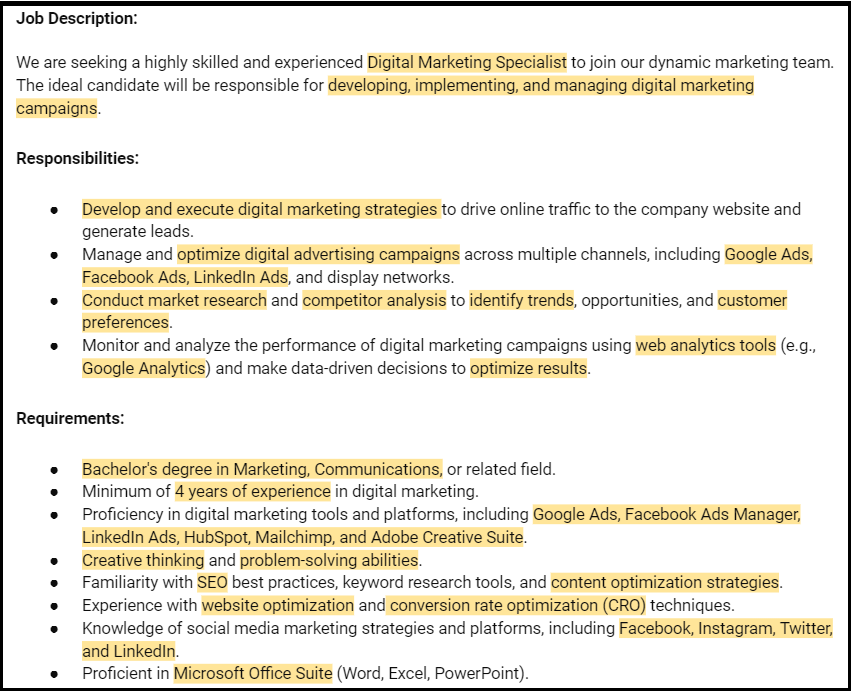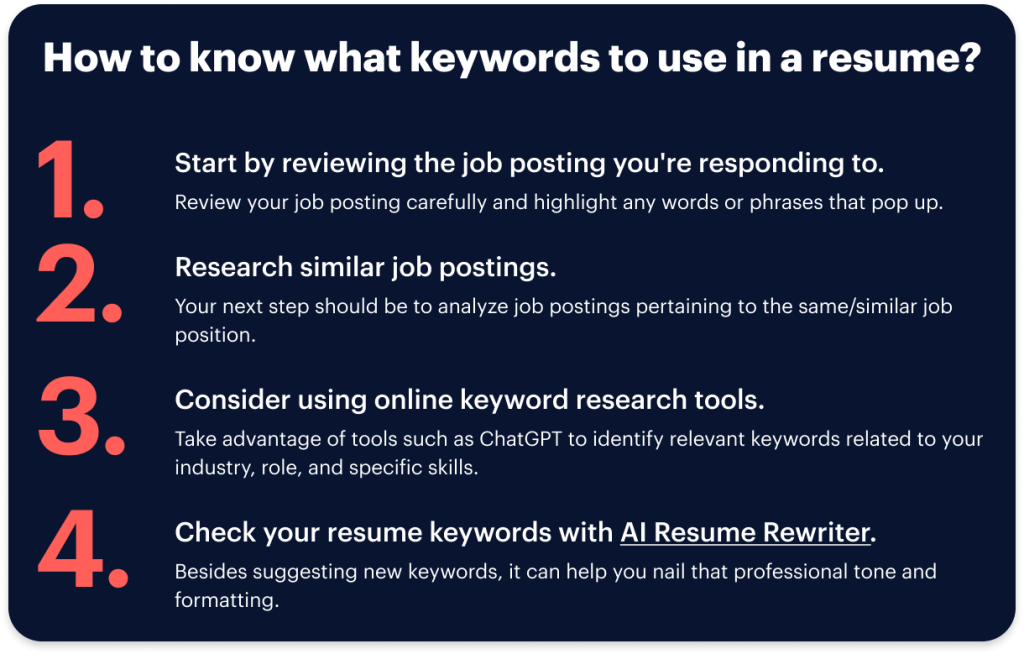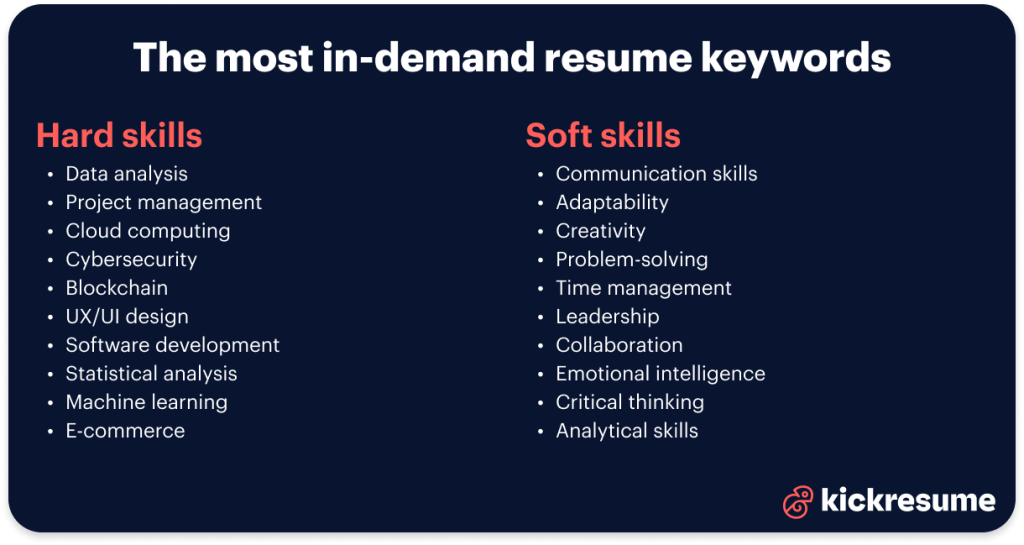No matter how many resume writing guides you read, none of them ever fails to stress the importance of resume keywords. But why is that?
Well, it's because they play a key role (wink wink) in making your resume ATS-friendly. Without them, your job application simply won't reach the recruiters’ eyes even if you're the perfect candidate for the job. But more on that later.
The burning question is: How can you tell which resume keywords are the best for you?
And that's exactly the question we'll be answering today!
So, if you're currently in the process of crafting your resume, be sure to continue reading our article and learn:
- What are keywords on a resume;
- How to know which resume keywords to use;
- Where to place your resume keywords;
- Which keywords are the most sought after;
- And, conversely, which (key)words to avoid.
- Why care about resume keywords
- What are keywords on a resume
- How to know what keywords to use in a resume
- Where to use keywords in your resume
- The most in-demand resume keywords in 2024
- What resume keywords to include based on your profession
- What resume (key)words you should avoid
- Key takeaways: Resume keywords
Why care about resume keywords
However, we can't delve into resume keywords without spending a few words on the Applicant Tracking System (ATS) and keyword scanners.
ATS is an HR computer software specifically designed to streamline the recruitment process. It can help the hiring managers in several ways, but what's interesting for you is how it processes your resume:
- Firstly, ATS scans your resume for relevant keywords (parsing).
- Secondly, it awards your resume a percentage score based on how closely your keywords match those sought after by the employer. The more relevant keywords, the higher the score.
- And thirdly, it filters through the submitted resumes and ranks them based on the abovementioned percentage score. And the higher you rank, the more likely you are to get noticed by the recruiters.
Besides the ATS, recruiters can also use standalone keyword scanners. But these function on more or less the same principles.
The bottom line is, in the world of job hunting, keywords are a pretty big deal. And you must get them just right!
What are keywords on a resume
So, what exactly do keywords for resume look like?
They can be specific terms or phrases describing requirements that directly relate to the job you're applying for. They typically include essential skills, qualifications, experiences, and competencies that employers are seeking in candidates for a particular role.
Let’s have a look at a specific example so you'd have a better idea of what we're talking about here.
Below, you'll find a mock job posting we've created with highlighted keywords.

Judging by the sea of orange, you can see that pretty much anything can be made into resume keywords.
But if we continue to work with our example, we can break the keywords down into several categories:
- Degrees (Bachelor's degree in Marketing, Bachelor's degree in Communications)
- Job duties (developing, implementing, and managing digital marketing campaigns; develop and execute digital marketing strategies; conduct market research; etc.)
- Soft skills (Creative thinking, problem-solving abilities)
- Computer skills (Microsoft Office Suite, Google Analytics, Adobe Creative Suite)
- Industry-specific hard skills (SEO, conversion rate optimization [CRO], Google Ads, Facebook Ads Manager, LinkedIn Ads, HubSpot, Mailchimp)
How to know what keywords to use in a resume
And now that you've got a solid understanding of what resume keywords are and their importance, let's look at how you can find out what keywords to use in a resume you're currently working on.
Here's how you can figure it out in 4 simple steps:
- Start by reviewing the job posting you're responding to.
Firstly, review your job posting carefully and highlight any words or phrases that pop up (just like we did with our example). This step is by far the most indicative, since the job posting tells you what exactly are these particular employers looking for.
- Research similar job postings.
But what if your job posting isn't particularly generous with the job requirements description? If that's the case, your next step should be to analyze job postings pertaining to the same/similar job position. Although precise requirements can differ from employer to employer, the basic skills needed to handle the job remain largely the same.
- Consider using online keyword research tools.
Another step worth exploring is to take advantage of tools such as Moz Keyword Explorer or the good old ChatGPT to identify relevant keywords related to your industry, role, and specific skills.
- Lastly, check your resume keywords with AI Resume Rewriter.
Although AI-powered tools can be daunting, navigating them is actually really simple and intuitive. Our AI Resume rewriter analyzes the content of your existing resume, as well as job postings for your desired job or industry. Besides suggesting new keywords, it can help you nail that professional tone and formatting. All you need to do is upload your resume and wait. That's it!
Following these steps should provide you with plenty of potential resume keywords to choose from. But don't forget, the most reliable source of relevant keywords is always the specific job posting you're applying for.

Where to use keywords in your resume
To ensure that your resume is easy to read for both the ATS and the hiring manager’s eyes, your keywords should be weaved naturally throughout the whole document.
Yes, we know, it's really tempting to make a “Keywords section,” stuff it with all the necessary words and phrases and be done with it. But, unfortunately, that's simply not good enough.
Remember how we divided the keywords from our example into different categories based on what types of skills/experience/requirements they represented? Well, all that effort will come in handy now!
Organizing your resume keywords in such a way gives you a good idea of where to later place them on your resume.
Keywords for resume summary
Since your resume summary’s main purpose is to hook recruiters by presenting your most impressive qualifications, it's a great place to start sneaking in those keywords!
Generally speaking, there isn't any rule as to which keywords should be featured in this section, but we do have two humble recommendations:
- The title of the position you're looking to fill.
- How many years of experience you have.
What these two? Well, that's because it's pretty difficult to fit them elsewhere.
Based on our example, we could start our resume summary with: “Detailed-oriented Digital Marketing Specialist with more than 4 years of experience.”
And voilà — two resume keywords with one stone!
Keywords for education section
Similarly, your education section is also quite straightforward when it comes to keywords. Here, you can simply include keywords in the form of degrees if the job posting calls for any.
But pay close attention to the wording!
For example: Our made-up posting uses the phrase “Bachelor's degree in Marketing.” Therefore, in your education section, you should write “Bachelor's degree in Marketing,” not “B.A. in Marketing”!
Keywords for resume skills
And, in your skills section, you should mention your skills. Yes, mind-blowing, we know!
If there's a place anywhere on your resume where it's okay to dump as many keywords as possible, this is it. Just make sure to further divide your skills section into sub-categories (like language skills, computer skills, interpersonal skills, …) for the sake of readability.
And, if any of your skills are known in the industry by their acronyms, be sure to include this version of the keyword as well.
For example: Don't just write “conversion rate optimization,” or “CRO.” Instead, use both versions like so — “conversion rate optimization (CRO).”
Keywords for work experience section
Finally, we get to the most extensive part of your resume — your work experience section. And here, all gloves are off! You can incorporate a wide variety of keywords describing your skills, your industry knowledge, or job duties.
Also, don't be afraid of repetitions! In fact, the most important keywords should appear 2-3 times throughout your resume.
And, one last golden nugget of information for you! If you want to avoid unnecessary words on your resume and come across as more proactive, turn your job duty nouns into action verbs.
For example like this:
Action verbs on resume example
The most in-demand resume keywords in 2024
As we've already mentioned, each and every job posting is unique and so are the keywords they contain.
But, there are several keywords that seem to be particularly popular with the employers at the moment. Have a look, why not? Maybe some of them will be suited for your resume as well.
Top 10 resume keywords for hard skills
- Data analysis
- Project management
- Cloud computing
- Cybersecurity
- Blockchain
- UX/UI design
- Software development
- Statistical analysis
- Machine learning
- E-commerce
Top 10 resume keywords for soft skills
- Communication skills
- Adaptability
- Creativity
- Problem-solving
- Time management
- Leadership
- Collaboration
- Emotional intelligence
- Critical thinking
- Analytical skills

What resume keywords to include based on your profession
Now, let’s zoom in on three professions in particular and look at which keywords are the most widely expected to appear on your resume.
And what a better way to show you how it works in practice than adding some stunning resumes to the mix!
FYI, if any of these happen to catch your eye, feel free to use them as your first draft. Just click on the red button and write away!
#1 Project manager resume keywords
Project management is about making sure projects get done well and on time. It involves planning, organizing, and leading a team to reach goals within a set budget and schedule. Additionally, project managers help teams work together smoothly and solve any problems that might arise along the way.
Some of the most relevant keywords for you are:
- Project Management
- Agile Methodology
- Scrum
- Waterfall Methodology
- Budget Management
- Risk Management
- Stakeholder Engagement
- Team Leadership
- Project Planning
- Schedule Management
- Cross-functional Collaboration
- Resource Allocation
- Communication Skills
- Problem-solving
- Milestone Tracking
#2 Data analyst resume keywords
Data analysts sift through heaps of data to uncover important patterns and trends. By doing this, they help businesses and organizations make better decisions based on facts and figures. In a nutshell, they're vital parts of any company.
So, if you're looking to make a career as a data analysts, don't miss out on these neat resume keywords:
- Data analysis
- Statistical analysis
- Data visualization
- Data mining
- Quantitative analysis
- Data interpretation
- SQL (Structured Query Language)
- Python/R programming
- Machine learning
- Statistical modeling
- Excel/Spreadsheet proficiency
- Data cleansing
- Business intelligence (BI)
- Dashboard creation
- Predictive modeling
#3 Sales resume keywords
Sales is all about building relationships and helping people find what they need. And so, sales professionals need to listen to customers, understand their needs, and offer solutions that make them happy. After all, it's about connecting with people and making sure everyone leaves with a smile on their face.
On your sales professional resume, don't forget to include these resume keywords:
- Sales
- Customer relationship management (CRM)
- Business development
- Client acquisition
- Account management
- Lead generation
- Negotiation
- Closing deals
- Cold calling
- Prospecting
- Relationship building
- Client retention
- Sales strategy
- Revenue growth
- Pipeline management
What resume (key)words you should avoid
So far, we've talked (quite extensively) about all the keywords that shouldn't be missing from your resume. But what about the words that should be avoided at all costs?
Yep, there are such things as resume taboos, and we're going to explore them right now!
- Overused buzzwords. First of all, forget about hackneyed language like "innovative," "motivated," or "dynamic." These words have been used so much that they've lost all meaning. Instead, demonstrate these qualities through specific achievements and experiences.
- Passive language. Remember action verbs? Now, meet their less pretty cousins. Verbs like "assisted," "helped," or "participated in" can make you sound like that one person in a group project that only came for the presentation.
- Irrelevant skills. A simple rule of the thumb — if it doesn't add value to your resume, it shouldn't even be on it!
- Unnecessary filler words. Finally, go through your resume one more time and be merciless. Every little piece of fluff like "very," "really," "extremely," "basically," or “pretty” must go!
And there you have it, our short list of shame. Always proofread your resumes to remove these lapses of judgment and use more relevant resume keywords instead.
Key takeaways: Resume keywords
To sum it all up, resume keywords are essential for making your resume ATS-compliant.
Resume keywords are specific terms or phrases that describe requirements related to the job you're applying for.
You can find them as: qualifications, soft skills, hard skills, degrees, certificates, years of work experience, job duties, and competencies.
To find out what keywords to use on your resume, follow these 4 simple steps:
- Start by reviewing the job posting you're responding to. Highlight any words or phrases that pop up.
- Research similar job postings. Secondly, you can find inspiration by analyzing job postings pertaining to the same/similar job position. Because the basic skills needed to handle the job remain largely the same across all companies.
- Consider using online keyword research tools. Or, you can employ the help of keyword research tools freely available online.
- Lastly, check your resume keywords with AI Resume Rewriter. Besides suggesting new keywords, our Resume Rewriter can help you adjust the language of your resume to reflect your professionalism and attention to detail.






